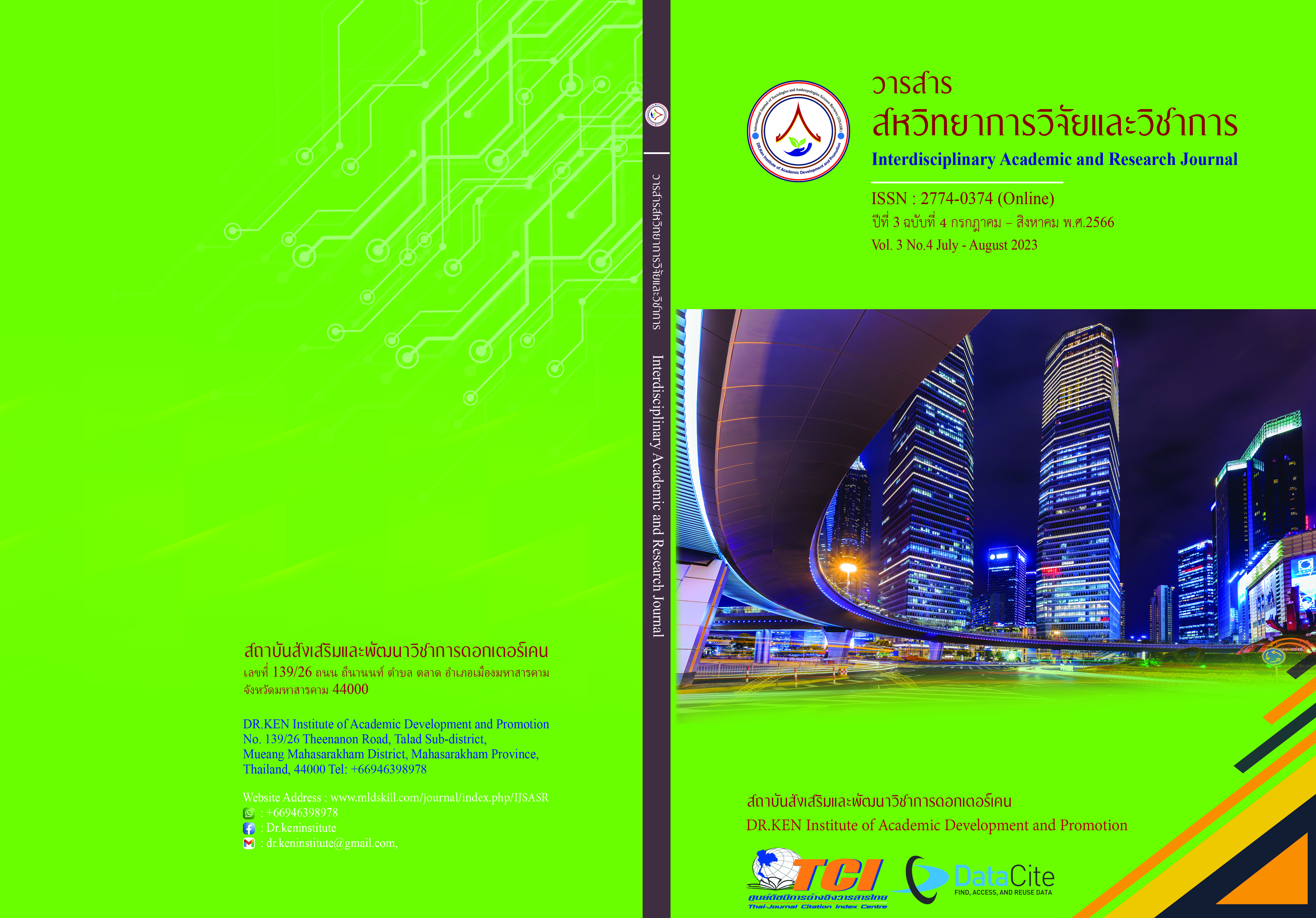Sustainable Community Enterprise Development Policy to Strengthen the Local Economy
DOI:
https://doi.org/10.14456/iarj.2023.208Keywords:
Sustainable Community Enterprise; , Strong Foundation EconomyAbstract
A policy to revitalize the economic situation of the government sector that will generate appropriate business practices, especially the concept of community enterprise (Community Enterprise) for the sustainable development of the community's economy. From that concept, it has resulted in a way to develop a strong community economy to create a mechanism to compete with both the domestic market and the international market even more. This study, therefore, has the following objectives; (1) to Study the development of sustainable community enterprises, and (2) a study strengthening the grassroots economy. The study of sustainable community enterprise development is a study of the principles, the history of community enterprises in Thailand and the study of the components of sustainable community enterprises, which consist of 4 elements: marketing, production, finance, and management as well as studying strengthening the grassroots economy as a study of meanings, principles, and drives for strengthening the integrated economy, with the participation of many sectors, including government, private sector, education and academic sector, civil society, and community enterprise or community business. The results show that the components of community enterprises are marketing, production, finance, and management. All of them are important and affect the operation to build a community enterprise to be strong and self-reliant according to the concept of stability, prosperity, and sustainability. As for the strengthening of the grassroots economy, all sectors must participate in an integrated way. All sectors are connected to drive the strengthening of the grassroots economy of the local community. And to elevate the economy, and society, and create income stability. This has resulted in the development of the quality of life of members and people in local communities to live well, eat well, and have good physical and mental health.
References
กนกวรรณ อุ้ยวงค์. (2564). การเพิ่มรายได้ของชุมชนด้วยความร่วมมือระหว่างภาครัฐและภาคเอกชนใน วิสาหกิจเพื่อสังคม: กรณีศึกษาวิสาหกิจชุมชนแปลงใหญ่ผักปลอดสารพิษ ตำบลบ้านโต้น อำเภอพระยืน จังหวัดขอนแก่น. วารสารวิทยาการจัดการ. 8(2), 242-256.
กรรณิการ์ สายเทพ และพิชญา เพิ่มไทย. (2560). แนวทางการพัฒนาผลิตภัณฑ์ท้องถิ่นเพื่อการส่งออกของ กลุ่มวิสาหกิจชุมชนดอกไม้ประดิษฐ์ ตำบลแม่ทะ อำเภอแม่ทะ จังหวัดลำปาง. วารสารวิทยาการจัดการ สมัยใหม่. 10(2), 1-11.
คณะทำงานการพัฒนาเศรษฐกิจฐานรากและประชารัฐ. (2559). สานพลังประชารัฐ. กรุงเทพมหานคร: อมรินทร์พริ้นติ้งแอนด์พับลิชชิ่ง.
จักรพงษ์ พวงงามชื่น และคณะ. (2558). การพัฒนาศักยภาพการบริหารจัดการวิสาหกิจชุมชนสู่ประชาคม เศรษฐกิจอาเซียน: กรณีศึกษาจังหวัดเชียงใหม่. รายงานผลการวิจัย. มหาวิทยาลัยแม่โจ้.
ชลกนก โฆษิตคณิน และคณะ. (2560). ปัญหา อุปสรรคและแนวทางการพัฒนาการจัดทำบัญชีวิสาหกิจชุมชน จังหวัดนครปฐม. วารสาร Veridian E-Journal, Silpakorn University ฉบับภาษาไทย สาขามนุษยศาสตร์ สังคมศาสตร์ และศิลปะ. 10(3), 2138-2151.
ทิพย์วรรณ จันทรา และคณะ(2565). การพัฒนาวิสาหกิจชุมชนแบบยั่งยืนของกลุ่มอาชีพ ในเขตพื้นที่บ้านดอน โรง ตำบลเขาพระบาท อำเภอเชียงใหญ่ จังหวัดนครศรีธรรมราช. วารสารมหาจุฬานาครทรรศน์. 9(4), 418-435.
นงคราญ ไชยเมือง. (2558). การพัฒนาการจัดการของกลุ่มวิสาหกิจชุมชนสู่การพึ่งพาตนเองอย่างยั่งยืน. วารสารมหาวิทยาลัยพายัพ. 25(1), 15-39.
บัวพันธ์ พรหมพักพิง. (2555). ความอยู่ดีมีสุข. วารสารมนุษยศาสตร์สังคมศาสตร์ มหาวิทยาลัยขอนแก่น. 29(2), 23-50.
ปัณณวิชญ์ แสงหล้า และคณะ. (2565). การพัฒนาองค์ความรู้เศรษฐกิจฐานรากของชุมชนเพื่อความยั่งยืนใน ศตวรรษที่ 21. วารสารมหาจุฬาวิชาการ. 9(3), 290-303.
พรชัย พันธุ์ธาดาพร. (2558). การมีส่วนร่วมในการดำเนินงานวิสาหกิจชุมชน จังหวัดพระนครสรีอยุธยา. รายงานวิจัย.มหาวิทยาลัยเทคโนโลยีราชมงคลสุวรรณภูมิ.
พระปลัดสุระ ญาณธโร(จันทึก) และอรพิน ปิยะสกุลเกียรติ. (2561). บทบาทของสภาองค์กรชุมชนในการ พัฒนาเศรษฐกิจฐานรากในพื้นที่จังหวัดสุรินทร์. รายงานการวิจัย. มหาวิทยาลัยมหาจุฬาลงกรณราช วิทยาลัย วิทยาเขตสุรินทร์.
ภวัต พัฒนนิภากร และเสาวลักษณ์ โกศลกิตติอัมพร. (2562). บทบาทองค์กรปกครองส่วนท้องถิ่นสู่ไทยแลนด์ 4.0. วารสาร มจร อุบลปริทรรศน์. 4(1), 53-69.
เมธิกา พ่วงแสง และหญิง มัทนัง. (2563). แนวทางการส่งเสริมการตลาดสำหรับกลุ่มวิสาหกิจชุมชนสตรีบ้าน บึง ตำบลบ้านบึง อำเภอบ้านคา จังหวัดราชบุรี. วารสารปัญญาภิวัฒน์. 12(2), 55-66.
เยาวลักษณ์ สุวรรณแข และคณะ.(2566). การถ่ายทอดความรู้ด้วย SECI Model เพื่อการสร้างมูลค่าเพิ่มให้ผลิตภัณฑ์ การเกษตรของวิสาหกิจชุมชนตำบลนาข้าวเสีย และเครือข่าย อำเภอนาโยง จังหวัดตรัง. วารสารอินทนิล ทักษิณสาร. 18(1), 173-194.
วรรณวิภา ไตลังคะ และโชติ บดีรัฐ, (2565), นโยบายและกลไกการส่งเสริมการเกษตรมูลค่าสูงขององค์กร ปกครองส่วนท้องถิ่น, วารสารคุณภาพชีวิตกับกฎหมาย, 18(1), 95-107.
ศุภชัย เหมือนโพธิ์ และธีรศักดิ์ อุ่นอารมณ์เลิศ. (2561). การพัฒนาศักยภาพผู้ประกอบการประชุม ตาม แนวคิดเศรษฐกิจสร้างสรรค์. วารสารศิลปากรศึกษาศาสตร์วิจัย. 10(1), 131-144.
สถาบันพัฒนาองค์กรชุมชน. (2558). 15 ปี 15 รูปธรรม “พลังองค์กรชุมชน ขับเคลื่อนเศรษฐกิจฐานราก”. กรุงเทพมหานคร: สถาบันพัฒนาองค์กรชุมชน.
สัญญา เคณาภูมิ. (2558). แนวทางการพัฒนาประสิทธิผลของวิสาหกิจชุมชนในเขตพื้นที่จังหวัดมหาสารคาม. วารสารวิชาการแพรวากาฬสินธุ์ มหาวิทยาลัยกาฬสินธุ์. 2(3), 68-85.
สำนักงานคณะกรรมการพัฒนาการเศรษฐกิจและสังคมแห่งชาติ. (2560). แผนพัฒนาเศรษฐกิจและสังคม แห่งชาติ ฉบับที่ 12 (พ.ศ. 2560-2564). กรุงเทพมหานคร: สำนักงานคณะกรรมการพัฒนาเศรษฐกิจ และสังคมแห่งชาติ.
สำนักเลขาธิการนายกรัฐมนตรี.(2564). คำแถลงประกอบงบประมาณรายจ่ายประจำปีงบประมาณ พ.ศ. 2565 พลเอก ประยุทธ์ จันทร์โอชา นายกรัฐมนตรี แถลงต่อสภาผู้แทนราษฎร. รัฐบาลไทย. Retrieved on December 5, 2022. Source http://www.thaigov.goth/news/contens/details/42246 .
อุทัย ปริญญาสุทธินันท์. (2560). วิสาหกิจชุมชน ปฏิทรรศน์ในการแข่งขันทางธุรกิจ. วารสารมหาวิทยาลัยศิลปากร ฉบับภาษาไทย. 37(2), 131-150.
Downloads
Published
How to Cite
Issue
Section
License
Copyright (c) 2023 Tanakorn Chanyam, Anuchit Mola, Kampanart Wongwatthanaphong

This work is licensed under a Creative Commons Attribution-NonCommercial-NoDerivatives 4.0 International License.
Copyright on any article in the Interdisciplinary Academic and Research Journal is retained by the author(s) under the under the Creative Commons Attribution-NonCommercial-NoDerivatives 4.0 International License. Permission to use text, content, images, etc. of publication. Any user to read, download, copy, distribute, print, search, or link to the full texts of articles, crawl them for indexing, pass them as data to software, or use them for any other lawful purpose. But do not use it for commercial use or with the intent to benefit any business.
















.png)


